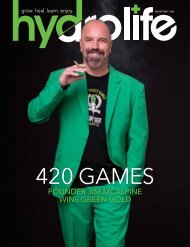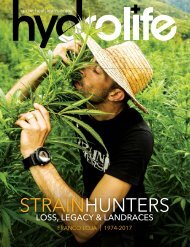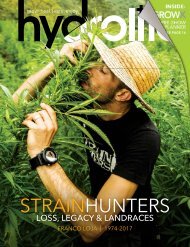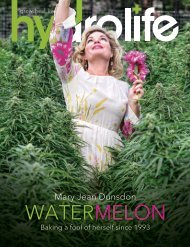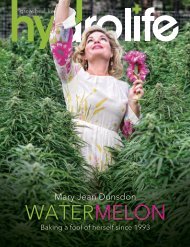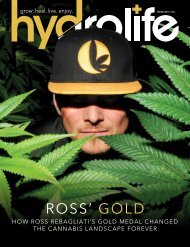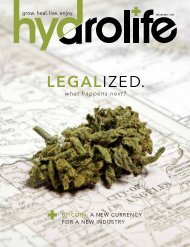Hydrolife Canada February/March 2017
It is amazing how an event from almost 20 years ago can remain fresh in the mind. It certainly doesn’t seem that long ago that Canadian Ross Rebagliati rocketed down Nagano’s Olympic giant slalom snowboard course, ripping through the finish line to claim the first-ever Olympic men’s snowboarding gold medal despite starting the final run in eighth position. Since then, Rebagliati has become a cultural phenomenon and advocate of marijuana use, and it is no coincidence that since that foggy day on Mount Yakebitai near Nagano, how we perceive the use of marijuana in society has changed for the better. Hydrolife recently caught up with Rebagliati to talk about Nagano, his thoughts on marijuana, and the launch of Ross’ Gold.
It is amazing how an event from almost 20 years ago can remain fresh in the mind. It certainly doesn’t seem that long ago that Canadian Ross Rebagliati rocketed down Nagano’s Olympic giant slalom snowboard course, ripping through the finish line to claim the first-ever Olympic men’s snowboarding gold medal despite starting the final run in eighth position. Since then, Rebagliati has become a cultural phenomenon and advocate of marijuana
use, and it is no coincidence that since that foggy day on Mount Yakebitai near Nagano, how we perceive the use of marijuana in society has changed for the better. Hydrolife recently caught up with Rebagliati to talk about Nagano, his thoughts on marijuana, and the launch of Ross’ Gold.
You also want an ePaper? Increase the reach of your titles
YUMPU automatically turns print PDFs into web optimized ePapers that Google loves.
enhancement from: being healthy on that regular<br />
day-to-day basis, having the motivation to go to<br />
the gym and do your workouts. I would do a bike<br />
ride that was 150-km long and I would stop every<br />
two hours basically to smoke a joint. At first, it [the<br />
ride] was kinda nice, like ‘Oh, beautiful.’ But after<br />
100 km or 120 km, it’s like, ‘What am I even doing<br />
out here? This is ridiculous!’ And then, you smoke<br />
a joint and you’re like, ‘This is kinda fun actually,’<br />
and you get back on your bike and keep going.<br />
So, you know the exercise that you get from your<br />
workout, due to the motivation that you’re getting<br />
from using cannabis, at the end of the day is<br />
performance enhancing.<br />
HL: How do you feel the public perception around<br />
using pot has changed, from the time you won<br />
your medal to today?<br />
R: It’s changed a lot. I think it’s going to change<br />
a little bit more, but I think that everybody is<br />
starting to realize that the science is backing up<br />
the industry; it’s backing up the cannabis plant.<br />
I felt like it was my responsibility after Japan to<br />
not turn my back on it, but to make people realize<br />
that it wasn’t a mistake that I was using cannabis<br />
before the Olympics. It was a mistake that I tested<br />
positive for it because I didn’t know I was failing<br />
my drug test before I went there; as it turned out, I<br />
had tested positive three times for cannabis before<br />
I went and I didn’t know. They didn’t tell me about<br />
it, so I could have made sure I wasn’t going to test<br />
positive for it. It’s kind of weird—they wouldn’t tell<br />
you, but then they took your medal away after you<br />
get there. Anyways, perception has changed a lot.<br />
At the time, people were really, I don’t want to say<br />
brainwashed, but the propaganda that was put<br />
out there in the ’80s especially about the dangers<br />
of cannabis and that it was a gateway drug. That<br />
was the beginning of a new idea about it.<br />
HL: You haven’t exactly faded from the<br />
limelight. You have multi-million dollar real<br />
estate developments, you participate in several<br />
charities, you’re working through licensing with a<br />
medical marijuana company. How do you stay so<br />
focused on so many things?<br />
R: I am pretty busy, compared to some people. I<br />
think that I’m just accustomed to it. [I] focused on<br />
my racing and all that it entails, and throughout<br />
the ’90s, I was flipping real estate in Whistler<br />
and that basically paid my way to the World Cup<br />
Tour and to the Olympics. I had some European<br />
sponsors, but I was on a shoestring budget.<br />
I've been paying a mortgage since I was 19. I’m<br />
used to having these pressures on me and at<br />
first, they’re like these huge pressures, then the<br />
feeling just becomes normal; the new normal.<br />
Having kids helped me focus a lot. I’ve worked in<br />
the construction industry for roughly 10 years in<br />
Whistler, building houses there. That gave me a<br />
different perspective on life and what a dollar is<br />
worth and that sort of thing.<br />
And so I always kind of felt I had more to do and<br />
I was waiting and waiting for cannabis to sort of<br />
catch up to where I was or where British Columbia<br />
was so that I could launch Ross’ Gold and have it<br />
be successful and looked up to instead of, ‘Oh, now<br />
look what he’s doing!’, you know? I feel like when<br />
we finally came out four or five years ago with the<br />
“I FOUND THAT if I smoked some<br />
cannabis in the morning before I<br />
would go to the gym, I would feel<br />
so much more enthusiastic about it.”<br />
company that it was still ahead of the curve, it<br />
was still an edgy idea. But now after five years of<br />
growing the company, our store is about to open.<br />
Not only that, but the federal government is finally<br />
being proactive about legalization, so now it’s the<br />
perfect storm. But it took me a lot of years to get<br />
here, for everyone to catch up and in the meantime, I<br />
sort of had to make do. You know, I did walk on to job<br />
sites in Whistler looking for work. I did go through<br />
a period where I was basically broke and had to<br />
kind of build up from zero. I went through some<br />
unfortunate relationships that not only emotionally<br />
but financially drained me. And so, I think it’s just<br />
life. Going through life and realizing that the bad<br />
feelings do go away and that the sun does shine.<br />
There’s been some tough years, but it’s made me<br />
realize that you just keep doing what you want to do<br />
and what you love. And just never give up about it<br />
and you can accomplish it. I did it once already!<br />
myhydrolife.ca grow. heal. live. enjoy. 63




![Hydrolife Magazine December 2017/January 2018 [CANADIAN EDITION]](https://img.yumpu.com/59790088/1/190x247/hydrolife-magazine-december-2017-january-2018-canadian-edition.jpg?quality=85)
![Hydrolife Magazine December 2017/January 2018 [USA EDITION]](https://img.yumpu.com/59790042/1/190x247/hydrolife-magazine-december-2017-january-2018-usa-edition.jpg?quality=85)
![Hydrolife Magazine October/November 2017 [Canada Edition]](https://img.yumpu.com/59493562/1/190x247/hydrolife-magazine-october-november-2017-canada-edition.jpg?quality=85)
![Hydrolife Magazine October/November 2017 [USA Edition]](https://img.yumpu.com/59493548/1/190x247/hydrolife-magazine-october-november-2017-usa-edition.jpg?quality=85)
![Hydrolife Magazine August/September 2017 [USA Edition]](https://img.yumpu.com/59236656/1/190x247/hydrolife-magazine-august-september-2017-usa-edition.jpg?quality=85)
